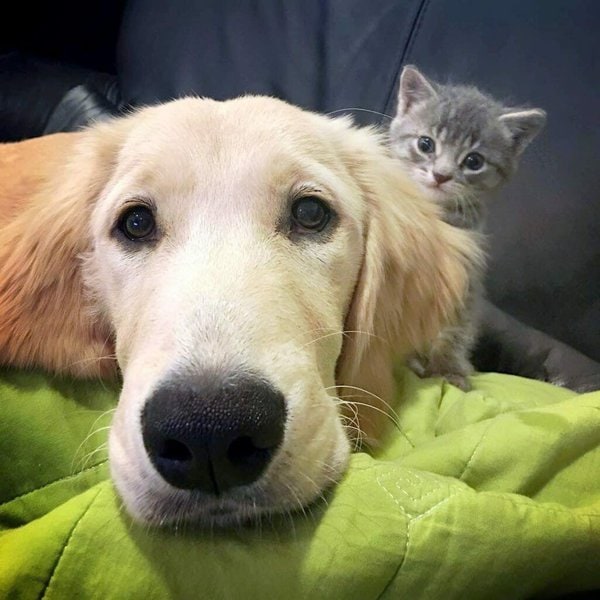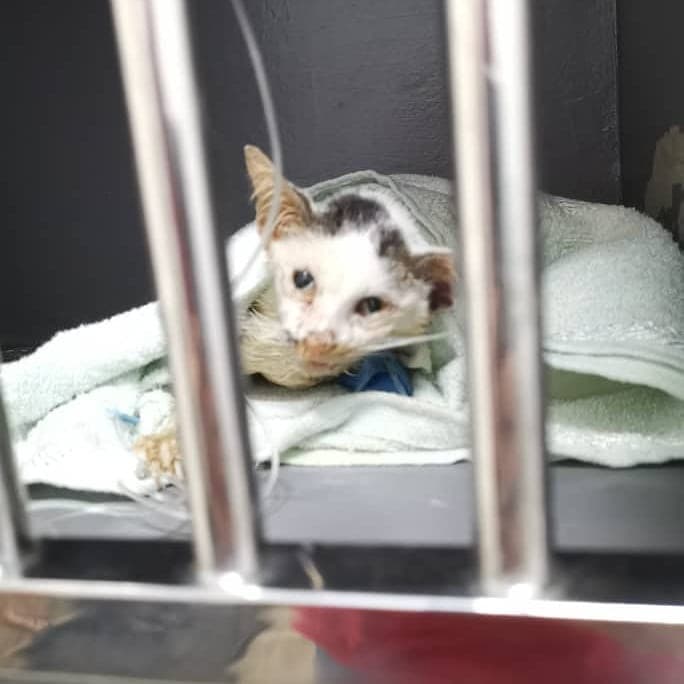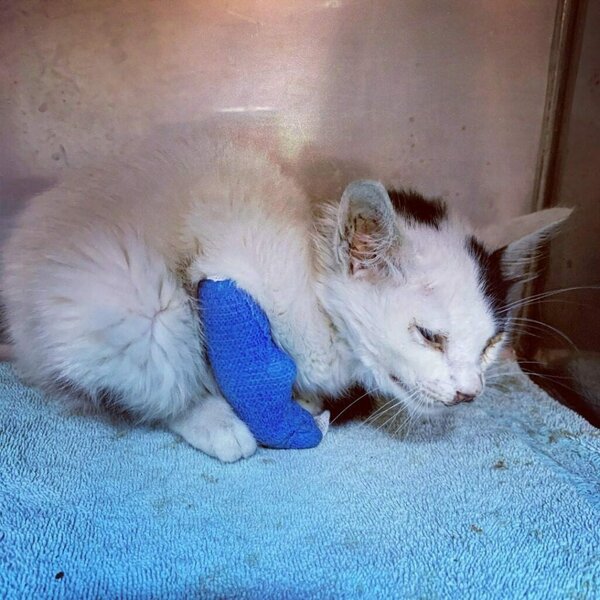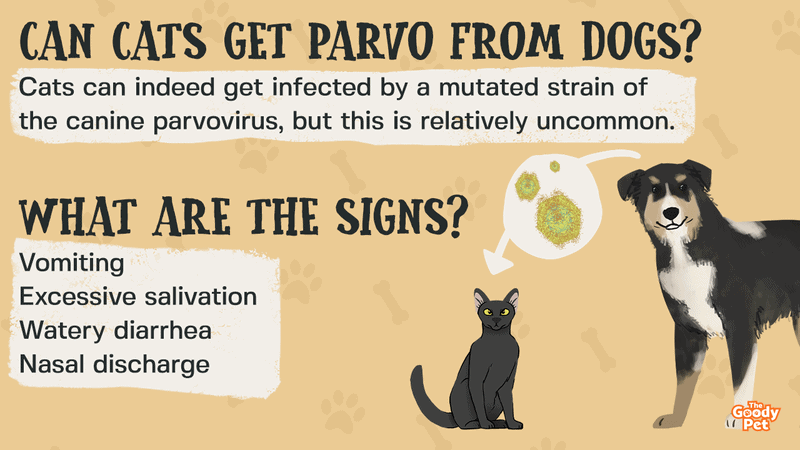Parvo is the nightmare of dog owners around the world, with the high fatality rate of this disease giving several dog parents sleepless nights. And given how contagious this disease is among dogs, it is only right to wonder if cats are prone to contracting parvovirus from their canine counterparts.
So, can cats get Parvo from dogs? Cats can get infected with parvovirus by coming in contact with a pooch carrying this disease, but the chances of this happening are extremely rare. That said, the canine parvovirus has a considerably high fatality rate, and the feline version of this disease is equally as dangerous.
Parvovirus in both cats and dogs share several similarities, apart from both being deadly, and we’ll take a look at some of these similar attributes in today’s article. Recognition of the symptoms of parvovirus is essential for the early diagnosis and appropriate treatment of this disease in cats, and this is why we have also outlined some of the signs associated with parvovirus in cats.
However, before we go into all this, let’s see why it is possible for a cat to be infected with canine parvovirus.
Can Cats Get Parvovirus From Dogs?

Cats can indeed get infected by a mutated strain of the canine parvovirus, but this is relatively uncommon.
It was originally believed that canine parvovirus was none-transferable to cats. However, recent studies have shown that canine parvovirus has recently acquired the feline host range, which means it is equally capable of infecting cats.
Over time, the canine parvovirus has mutated, and the newer versions of this infection have been seen in feline hosts.
Is Cat And Dog Parvo The Same?
Having established that cats are capable of contracting canine parvovirus, it is important to note that the strain of this disease that occurs in dogs is slightly different from the one that is observed in their feline counterparts.
The form of parvovirus that occurs in cats is known as the feline panleukopenia, and research carried out by the Journal of Dairy, Veterinary & Animal Research shows that there’s only a 0.5% difference between the DNA sequences of the canine parvovirus and the feline panleukopenia.
The feline panleukopenia is a life-threatening and highly contagious viral infection that attacks and kills the blood cells in a kitty’s body and puts the cat at risk of suffering from several other bacterial and viral infections.
How Do Cats Get Parvo From Dogs?
The major method by which a kitty can contract parvovirus from an infected pooch is if the cat comes in direct contact with the fecal matter of such a dog. And once this parvovirus finds its way into a cat’s body system, the virus immediately goes to work by penetrating the kitty’s eye, gut, and bone marrow cells, subsequently destroying these cells.
Additionally, it is also speculated that cats can indirectly contract parvovirus from dogs, although there isn’t substantial scientific evidence to back this claim up.
Canine parvovirus can survive for significant periods on clothing, furniture, and even on human skin, and if a cat comes in contact with these infected surfaces, there is every chance that such a kitty will contract the parvovirus.
It is also worth noting that a cat infected with feline panleukopenia can pass the disease across to other cats, and this mode of transmission is prevalent in environments where there are lots of kitties in contact with each other.
What Cats Are At A Risk Of Contracting Parvovirus?
Unvaccinated kittens between the ages of 2 to 6 months are at a higher risk of contracting feline parvovirus and displaying the symptoms associated with this disease.
However, it is also possible for unvaccinated adult cats to contract feline panleukopenia, with the only difference being that they may not exhibit the symptoms consistent with this disease.
Feline parvovirus is also capable of infecting the fetuses of pregnant queen cats, and this typically occurs as damage to the brains of the unborn kittens, thereby resulting in the birth of kittens with balance and feeding problems.
What Are The Signs That A Cat Has Been Infected With Parvovirus?

Symptoms of parvovirus in cats include vomiting, diarrhea, weakness caused by loss of red blood cells, and an inability to feed, just to mention a few.
We’ve stated earlier that the parvovirus strain observed in dogs is slightly different from that of cats, but the symptoms of this disease are considerably similar for both species. And the canine parvovirus is equally as contagious and easily spread as the cat panleukopenia.
That said, some of the symptoms that are typically exhibited by cats suffering from feline panleukopenia include:
- Vomiting
- Excessive salivation and the presence of froth around the lips
- An inability to eat or drink, in spite of hunger and thirst
- Watery diarrhea, which can be sometimes accompanied by blood
- Inconsistent temperature – raised during the early stages of the infection and lowered as the infection progresses
- Nasal discharge
- Loss of body coordination
- Anemia, which is caused by a reduction in the red blood cell count
- Weight loss
How Is Parvovirus Treated In Cats?
Treatment of parvovirus in cats is based on managing the symptoms of this disease, with vets typically recommending fluid therapy, assisted therapy, combined with good nursing, to combat this disease.
Contact Your Vet
Unless you’re a suitably qualified and equipped medical practitioner, there is little to nothing you can do to treat your kitty’s parvovirus at home.
When you notice the signs of feline parvovirus in your kitty, the immediate thing you should do is immediately isolate the cat to prevent further spread. But even then, proper medical attention has to be given to such a cat as soon as possible.
Upon arriving at the hospital, the vet will usually take blood and fecal samples from the sick cat to test whether the feline is indeed suffering from parvovirus.
If unfortunately, the cat dies before you see a vet, the vet can also test the dead kitty’s intestines to check for the presence of the virus.
That said, there is no known cure for parvovirus in both cats and dogs, with treatment methods focusing mainly on managing the symptoms associated with this disease.
In most cases, vets prescribe the use of antibiotics to help contain the spread of harmful bacteria through the intestine walls damaged by the actions of the parvovirus. Also, because feline parvovirus typically induces dehydration in cats, vets usually administer intravenous fluids to cater for and replace the kitty’s lost bodily fluids.
How Can I Prevent My Cat From Contracting Parvovirus?
As earlier stated, there is no known cure for parvovirus in cats; Hence, to guarantee your kitty’s safety, it is best that you ensure your feline gets vaccinated as at when due.
Vaccination is the main method of prevention for cat panleukopenia, with primary vaccination courses administered when kittens are between eight to nine weeks old.
The second vaccination course is usually administered between three to four weeks after the first, and ideally, vaccinated adult cats should regularly receive boosters.






